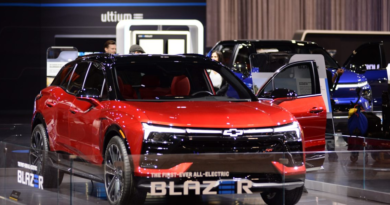Intel wins $7.9 billion award under CHIPS Act
Good morning. Lean and mean today, just like a turkey. If you celebrate, Happy Thanksgiving to you and yours. —Andrew Nusca
P.S. That means we’re off tomorrow for the holiday. Colleagues David Meyer and Alexei Oreskovic will return on Friday.
P.P.S. I never told you about our brilliant Fortune Brainstorm Design conference, which returns to Macau next week. On tap: Gensler, Beats by Dre, industrial designer Tom Dixon, Gadi Amit of NewDealDesign, and execs from an array of tech stalwarts including Cisco, Google Ventures, SAP, and Salesforce. Keen to attend? Register your interest here.
Want to send thoughts or suggestions to Data Sheet? Drop a line here.
Intel wins $7.9 billion award under CHIPS Act

The Biden administration said Tuesday that it would award up to $7.865 billion in direct funding to Intel to build or expand semiconductor factories in several U.S. states.
The sum is promised as part of the 2022 CHIPS Act, aimed at reducing reliance on foreign chips. It’s also less than the $8.5 billion initially promised to Intel in March. The White House says that’s because the company received another $3 billion contract to make chips for the U.S. military.
Intel will receive at least $1 billion of that total before the end of the year. It will also benefit from extended timelines for some projects beyond the government’s 2030 deadline.
That’s good news for Intel, which last month reported the largest quarterly loss in its history. The storied Silicon Valley firm has been cutting costs and resisting takeover interest as it tries to reorganize. Its current market value, at $102 billion, is just a third of what it was only four years ago.
OpenAI’s hotly anticipated Sora video tool leaks
A group of artists volunteering as beta testers for OpenAI’s new and unreleased AI video product, Sora, publicly shared access to the tool on Tuesday to protest what they said were the company’s exploitative practices.
In an open letter posted on the Hugging Face platform, the group claimed they were invited by OpenAI to serve as Sora “testers” and “creative partners,” but realized they were being “lured into ‘art washing’ to tell the world that Sora is a useful tool for artists.” They also said OpenAI controlled and approved all outputs.
An OpenAI spokesperson said participation in the product’s research preview is “voluntary” and there’s “no obligation to provide feedback or use the tool.”
Sora is one of the most anticipated new products from OpenAI, the privately held company that makes ChatGPT and which has been valued at $157 billion. Generative AI video technology has the potential to upend Hollywood and many other creative industries that rely on video creation, from advertising to art. —Sharon Goldman
Rivian secures $6.6 billion gov’t loan for Georgia EV factory
The U.S. Department of Energy will make a $6.57 billion loan to cash-strapped electric automaker Rivian to build a factory in Georgia.
The facility, located about 40 miles east of Atlanta, would directly benefit Rivian’s cheaper, more broadly appealing midsize models: the R2 SUV and the R3/R3X crossover. The R2 is expected to start at about $45,000.
Rivian says the facility will be built in two phases that will result in 400,000 units of annual production capacity. The first phase will begin production in 2028.
The funds come at an opportune time for Rivian, whose CEO, RJ Scaringe, promised profitability by the end of this year. The automaker announced a $5.8 billion joint venture with Volkswagen last month.
The only question mark? What happens when Donald Trump returns to the White House. The President-elect once vowed to end federal electric vehicle tax credits; with Tesla CEO Elon Musk at his side, that’s in the air.
Mistral readies expansion in Silicon Valley
Europe has just one company that builds large language models—but it’s becoming a little more American.
Mistral, which is already backed by U.S. investors like Microsoft and Andreessen Horowitz, is expanding its operations in California. “Palo Alto’s rich talent pool makes it an ideal hub for our growth plans outside of our Parisian headquarter,” said a spokesperson.
The Financial Times also reports that co-founder Guillaume Lample may move to the U.S., though this is yet to be decided.
France and Europe in general may be watching this development nervously—President Emmanuel Macron has hailed Mistral as evidence of EU AI prowess.
Meanwhile, American rivals such as OpenAI and Anthropic will now find themselves facing more competition for talent on their home turf. —David Meyer
AI boom drives up shares of Texas land firm by 200%
Texas Pacific Land Corporation, or TPL, began as a land trust but found itself sitting on “black gold” soon after oil was discovered in West Texas during the early 1900s.
More recently, the company has begun exploring other ways to make money from its 873,000 acres. Betting that the region’s dirt-cheap natural gas will be a draw for America’s tech giants, TPL is luring renewable power projects, Bitcoin mines, and utility-scale battery production.
Then there’s the possibility of data centers, which has helped TPL nearly triple its stock price in the past year. There’s no shortage of investor hype for companies that could capitalize on the energy boom needed to power the AI revolution.
Data center power demand in the U.S. could grow roughly 160% by 2030, according to Goldman Sachs, accounting for nearly a tenth of the country’s energy usage. This has prompted plenty of concerns about carbon emissions.
Big Tech has begun to ink deals for nuclear power. Demand for natural gas, often dubbed the world’s “cleanest fossil fuel,” also seems set to surge—and it’s cheapest in West Texas. —Greg McKenna
More data
—Bitcoin never broke that $100,000 ceiling, by the way.
—South Korea earmarks $10bn in chipmaker support. Concerns over brewing trade wars.
—FCC approves SpaceX, T-Mobile license for Starlink to extend internet access to remote areas.
—Google tweaks EU search results. Hotels, airlines, retailers complained about fewer bookings.
—Lawsuit between Amazon influencers explores the limits of copyright infringement.





